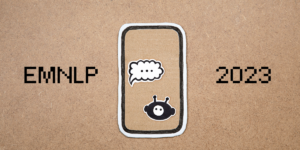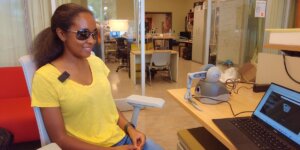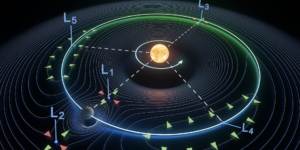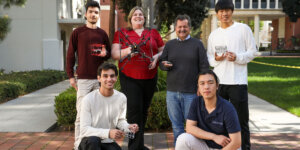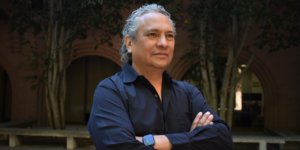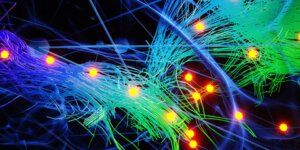
Design by Ella Marushchenko and Kate Zvorykina (Ella Maru Studio)
Brain disorders such as anxiety and depression are a leading cause of disability worldwide. Yet standard therapies, including medication or psychotherapy, fail a large proportion of patients — for example, 20% to 30% of those who suffer from depression.
Maryam Shanechi, Dean’s Professor in Electrical and Computer Engineering, Computer Science, and Biomedical Engineering, and the inaugural holder of the Alexander A. Sawchuk Chair in Electrical and Computer Engineering at the USC Viterbi School of Engineering, works toward addressing this major societal challenge. To do so, she founded the USC Center for Neurotechnology to develop brain-computer interface systems as potentially transformative therapies for these disorders.
In her lab, Shanechi develops novel AI and computing algorithms that decode a patient’s mental state (such as mood) from brain activity and use this decoding to precisely tailor therapies to the patient’s needs. She also develops algorithms to regulate abnormal brain activity patterns with different treatment modalities like deep brain stimulation.

Dr. Shanechi was honored as the founding director of the new USC Center for Neurotechnology during the San Jose State-USC football game at the Coliseum on Aug. 26, 2023. (USC Photo)
“Realizing these AI-based neurotechnologies has the potential to revolutionize how we treat brain disorders,” Shanechi said. “Doing so is a substantial challenge that requires a truly interdisciplinary effort between engineers, computer scientists, neuroscientists, and clinicians, whom we bring together in the Center.” Since its founding in 2023, the Center has been boosted by several grants, including $5 million in new funding from the National Institutes of Health’s BRAIN (Brain Research Through Advancing Innovative Neurotechnologies) Initiative.
The goal of this BRAIN initiative grant is to develop novel multimodal AI and sensing technologies for personalizing treatments in mental health conditions. Indeed, a major challenge in treating these conditions is the inter- and intra-subject variability in symptoms, how they respond to therapy, and how they emerge from complex brain activity patterns. Personalization is one way to address this variability: By tracking how a patient’s mental state — such as mood or stress — changes over time, one can take action based on their needs. For example, their dose of therapy could be adjusted, or they could be advised to consult their physician. But the tracking of mental states remains notoriously difficult because of the complexity and hidden nature of these states – we cannot see someone’s mood unlike, say, their movements.
Led by Shanechi, the interdisciplinary team in this grant will collect brain signals, physiological signals such as heart rate or cortisol levels, and behavioral signals from patients, then develop multimodal AI algorithms that decode mental states by fusing all these signals. “This effort will discover multimodal neural-physiological-behavioral biomarkers for mental states,” Shanechi said. At USC, the team includes a collaboration between the Viterbi School of Engineering and the Keck School of Medicine faculty across several departments including, Neurosurgery (Charles Liu and Brian Lee), Psychiatry (Adam Frank and Steven Siegel), Computer Science (Jonathan Gratch and Mohammad Soleymani), and Electrical and Computer Engineering (Yasser Khan). In addition to USC, the team also includes faculty at the University of Washington (Sara Goering and Eran Klein) who will study the neuroethics of developing neurotechnologies such that they address the concerns of patients and people with lived experience.
“The goal of the USC Center for Neurotechnology is to facilitate a truly interdisciplinary approach for addressing the immense complexity of the brain and transforming therapies for its conditions including neurological and mental disorders,” Shanechi said.
Published on May 21st, 2024
Last updated on May 23rd, 2024




